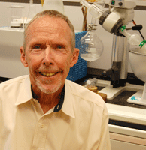
David G. Whitten, research professor of Chemical and Nuclear Engineering and Interim Director of the Center for Biomedical Engineering at the University of New Mexico, has been named a 2010 fellow of the American Chemical Society.
Whitten's current research is focused on electricity-conducting polymers. He and his research collaborators have created tiny microscopic spheres that trap and kill harmful bacteria similar to "roach motels." Bacteria are attracted to these polymers, and when they check in, they don't check out – they die. The capsules could lead to new coatings to disinfect clothing, surfaces, or medical devices. Recent findings show that there are an estimated 1.7 million hospital infections and 99,000 associated deaths each year. Whitten's research has been published widely in scientific journals as well as in the March 7, 2009 (Technology Quarterly) issue of the Economist.
Other pioneering and advanced research conducted by Whitten and his co-workers includes work in understanding photoinduced electronic transfer reactions and other applications for chemical conversions and energy storage processes.
An internationally known researcher and author, Whitten has published more than 333 papers in refereed journals and has more than a dozen patents. Since 1997, he has served as Editor-in-Chief of Langmuir, a peer-reviewed interdisciplinary journal published by the American Chemical Society. He has increased submissions 350%, leading the journal to great success in an ever-expanding field of research.
Whitten has received numerous national and international awards, including the NSF Research Award for Special Creativity in 1982 and again in 1990 and the NSF Science and Technology Pioneer Award in 2001. He has received a number of prestigious national and international awards, including an Alexander von Humboldt Award, the ACS Award in Colloid and Surface Chemistry, the Interamerican Photochemical Society Award in Photochemistry, and the "Special Award" of the Japanese Photochemical Association.
Fellows are chosen for the demonstrated excellence in their contributions to the chemical sciences and in service to the ACS and the chemistry community. The 2010 ACS Fellows will be honored during the ACS National Meeting in Boston on August 23, 2010.
ACS is the world's largest scientific society and a leading source of authoritative scientific information. The organization has more than 161,000 members and publishes numerous scientific journals and databases, convenes major research conferences and provides educational, science policy and career programs in chemistry.